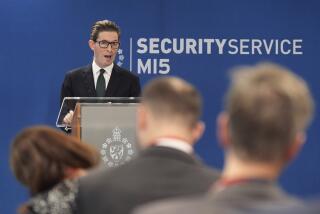British spy chief goes public to make case for secrecy
- Share via
Reporting from London — Britain’s top spy came in from the cold of a crisp autumn morning Thursday to condemn torture, warn of nuclear proliferation and defend the shadowy world of covert intelligence-gathering as crucial to keeping the country “safe and secure.”
John Sawers, the chief of the Secret Intelligence Service, made the comments in an unprecedented public speech in which he addressed allegations of British complicity in the abuse of terrorism suspects and pleaded with his compatriots to understand that, despite an ever-increasing trend toward official transparency, “secrecy is not a dirty word.”
Though it may seem odd for the leader of such a cloak-and-dagger organization to go on live national television to make the case for secrecy, Sawers is no ordinary spy: He is undoubtedly the first intelligence chief to have had his photos posted on his wife’s Facebook page showing him frolicking on the beach.
His message to an audience of journalists and academics was a serious one, however. Sawers said his agency, also known as MI6, helped keep Britain safe through a network of dedicated but unsung agents, some posted in far-off and dangerous lands, who provide the government with important information.
“We get inside terrorist organizations to see where the next threats are coming from,” he said. “What we do is not seen.”
Sawers said integrity remained the intelligence service’s most prized value, and he insisted that his agents were committed to “basic decency and moral principles” in spite of accusations that Britain has turned a blind eye to abusive practices by other countries’ spies and accepted intelligence from them.
“Torture is illegal and abhorrent under any circumstances, and we have nothing whatsoever to do with it,” Sawers declared.
But he acknowledged that his work often presented difficult ethical conundrums. What if, for example, Britain came upon credible evidence of a terrorist plot in another country but knew that turning over such information to the country involved could result in suspects being mistreated?
“These are not abstract questions for philosophy courses or searching editorials. They are real, constant, operational dilemmas,” he said. “Sometimes there is no clear way forward.”
A major terrorist attack in Britain, Sawers said, would exact a terrible human toll but would not bring down British democracy. More far-reaching a threat is the proliferation of nuclear arms, as well as chemical and biological weapons, which he said have the potential to “alter the whole balance of power in a region.” He warned that one such game-changer was developing in Iran.
Sawers emphasized that intelligence-gathering was a necessary companion to diplomacy. And for such intelligence-gathering to succeed, secrecy must be at a premium, vigilantly maintained to protect Britain’s agents, its sources and its partners’ confidences.
The need to stay in the shadows is at odds with growing demands for governments to do be more open. The pressure for full public disclosure has been epitomized in recent months by the leak of thousands of secret military documents on U.S. military activities in Iraq and Afghanistan, documents that have been posted on the Internet.
But to be effective, Sawers said, “secret organizations need to stay secret, even if we present an occasional public face, as I am doing today.”
Sawers, 55, took command of MI6 last year after a distinguished career as a diplomat, including stints as Britain’s ambassador to the United Nations and a special representative in Iraq. Within the agency, he is officially known as “C,” just as his fictional counterpart in the James Bond thrillers goes by “M.”
Unlike their counterparts at the CIA who play a much more public role, MI6 chiefs traditionally have worked far from the limelight. Sawers’ speech on the workings of MI6 was the first such public address in the agency’s 101 years of existence, and it follows the publication last month of an authorized history of the service’s first four decades. (MI6 concentrates exclusively on overseas spycraft, while another agency, MI5, deals with domestic intelligence.)
The British government did not publicly acknowledge the existence of MI6 until the 1990s. The location of its hulking headquarters, on the banks of the Thames, is still an official secret — but one virtually every Londoner knows.
More to Read
Sign up for Essential California
The most important California stories and recommendations in your inbox every morning.
You may occasionally receive promotional content from the Los Angeles Times.











